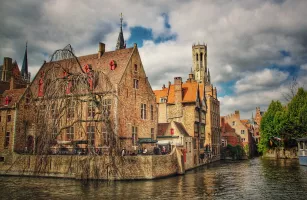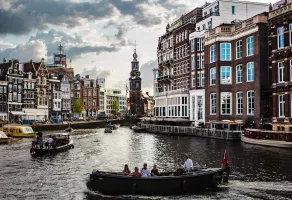The Cloth Hall Travel Guide
The Cloth Hall, located in the historic city of Ypres, Belgium, is a UNESCO World Heritage Site renowned for its rich history and cultural significance. Originally built in the 13th century as a commercial hub for the cloth trade, it stands as a symbol of the city's resilience after being destroyed during World War I. Today, it houses the In Flanders Fields Museum, which commemorates the region's wartime past. The Cloth Hall is a must-visit destination for history enthusiasts and cultural explorers seeking to delve into Belgium's captivating past.Top Attractions in The Cloth Hall
- In Flanders Fields Museum
- Ypres Market Square
- Menin Gate Memorial
- Saint Martin's Cathedral
- Ramparts Cemetery
The Cloth Hall is Famous for
Its historical significance and status as a symbol of Ypres' resilience post-World War I.Top Attractions in The Cloth Hall
- Immersive exhibits at In Flanders Fields Museum
- Exploring the bustling Ypres Market Square
- Paying respects at the Menin Gate Memorial
- Admiring the Gothic architecture of Saint Martin's Cathedral
- Reflecting at the poignant Ramparts Cemetery
What's Great about Travelling to The Cloth Hall?
- Rich historical significance
- Cultural exploration opportunities
- Unique World War I heritage
What's Not So Great about Travelling to The Cloth Hall?
- Limited dining options
- Peak tourist crowds
- Challenging parking availability
Travel Tips for The Cloth Hall
- Check visa requirements for Belgium
- Opt for public transportation within Ypres
- Be respectful at war memorials
Important The Cloth Hall trip information
- Ideal Duration: 2-3 days
- Best Time to Visit: Spring or Fall for mild weather
- Nearby Airports and Railway Stations: Brussels Airport, Ypres Railway Station
Total
15,32,000
*EXCLUDING APPLICABLE TAXES 5.0 Ratings
( 20 Reviews )
( 20 Reviews )
Per Person
2,88,500
*EXCLUDING APPLICABLE TAXES 5.0 Ratings
( 20 Reviews )
( 20 Reviews )
Total
4,63,000
*EXCLUDING APPLICABLE TAXES 5.0 Ratings
( 20 Reviews )
( 20 Reviews )
Total
5,58,500
*EXCLUDING APPLICABLE TAXES 5.0 Ratings
( 20 Reviews )
( 20 Reviews )
Total
5,55,000
*EXCLUDING APPLICABLE TAXES 5.0 Ratings
( 20 Reviews )
( 20 Reviews )
Total
3,96,500
*EXCLUDING APPLICABLE TAXES 5.0 Ratings
( 20 Reviews )
( 20 Reviews )
FAQ's on The cloth hall
Q1: What is the best time to visit The Cloth Hall?
The best time to visit The Cloth Hall is during the spring and summer months, from April to September, when the weather is mild and pleasant. This period is also ideal for exploring outdoor attractions and enjoying festivals and events in the area.
Q2: Do I need a visa to travel to The Cloth Hall?
Visitors from most countries in Europe do not need a visa to travel to The Cloth Hall for short stays. However, it's advisable to check the specific visa requirements based on your nationality before traveling. Make sure your passport is valid for the duration of your stay.
Q3: What are the must-visit attractions in The Cloth Hall?
The Cloth Hall offers a range of attractions, including the historic Market Square, St. Mary's Basilica, and Wawel Castle. Don't miss exploring the Wieliczka Salt Mine or taking a day trip to Auschwitz-Birkenau Memorial and Museum for a somber yet important experience.
Q4: Is The Cloth Hall a safe place to travel?
The Cloth Hall is generally a safe destination for travelers. Like any other city, it's essential to stay vigilant, especially in crowded areas and watch out for pickpockets. Avoid walking alone at night in poorly lit areas and follow basic safety precautions.
Q5: What is the local currency in The Cloth Hall and can I use credit cards?
The local currency in The Cloth Hall is the Polish Zloty (PLN). While credit cards are widely accepted in hotels, restaurants, and larger stores, it's advisable to carry some cash for smaller establishments and markets. ATMs are also readily available.
Q6: What is the local cuisine like in The Cloth Hall?
Polish cuisine in The Cloth Hall is hearty and flavorful, with dishes like pierogi (dumplings), bigos (hunter's stew), and oscypek (smoked cheese) being popular choices. Vegetarians can enjoy dishes like placki ziemniaczane (potato pancakes), and those with a sweet tooth should try sernik (cheesecake) or makowiec (poppy seed cake).
Q7: What transportation options are available in The Cloth Hall?
The Cloth Hall offers various transportation options, including trams, buses, and taxis for getting around the city. Renting a bike is also a popular choice for exploring the city at your own pace. Make sure to use reputable taxi services and public transportation for convenience.
Q8: Are there any cultural norms or etiquette I should be aware of when visiting The Cloth Hall?
When visiting The Cloth Hall, it's important to greet people with a handshake, maintain eye contact during conversations, and remove your shoes when entering someone's home. It's polite to address people by their titles and last names unless invited to use their first name. Respect local customs and traditions to have a positive and enriching experience.
Q9: I am a travel agent. How can I buy travel leads of The cloth hall?
Register yourself as a travel agent at agents.tripclap.com and then you can buy travel leads to The cloth hall once your account is approved. For more details contact our support team at +91-8069186564 or support@tripclap.com



